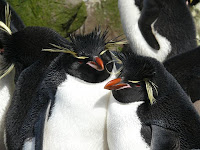 |
| Rockhopper penguins at Campbell Island. Credit: Paul Sagar, NIWA. |
NIWA scientists have successfully secured a grant from National Geographic in the United States which will enable a research team to embark on a dedicated trip to Campbell Island, where the penguins breed and moult. There the scientists will deploy 88 miniaturised tracking tags on the penguins' legs before the birds depart in April for the winter.
The tracking tags will be retrieved at the start of the following breeding season in October 2013.
The data obtained from the tags will, for the first time, shed light on the winter movements, distribution and habitat use of rockhopper penguins in New Zealand's sub-Antarctic.
"We don't know where the penguins go during winter," said NIWA scientist Dr David Thompson.
"It could be a crucial stage in the breeding cycle for them. To successfully raise chicks, they need to come back to Campbell Island at the start of the breeding season in good condition. If they have a bad winter, they will come back to Campbell Island in poor condition.
"This stage of the annual cycle of the birds is likely to be very significant. To know nothing about where this stage takes place is a crucial gap in our understanding of the factors affecting the penguin populations."
So where might the penguins go? Dr Thompson doesn't think it will be too far.
"I suspect they don't go too far south, nor are they likely to go too far north. They probably stay at the same latitude, but disperse away from the island, spending that time feeding and regaining condition."
Between 1942 and 1985, the rockhopper penguin population at Campbell Island declined by about 94%, from approximately 800,000 breeding pairs to just 51,000 pairs. The decline has continued since the mid-1980s.
"They are unlikely to become extinct, in the near future, but this represents a massive decline," said Dr Thompson.
One theory is that the population crash is the result of changes in the penguin's diet, but Dr Thompson doesn't think this is the case.
"We don't think that they have changed their diet. We think there is just less food ... They have quite a broad diet.
"It's thought that fluctuations in sea temperatures may have led to a reduction in the abundance or availability of their prey," he said.
Source
Scientists set to spy on rockhopper penguins, 12 June 2012, NIWA
No comments:
Post a Comment